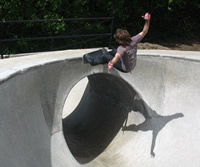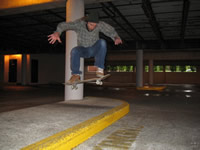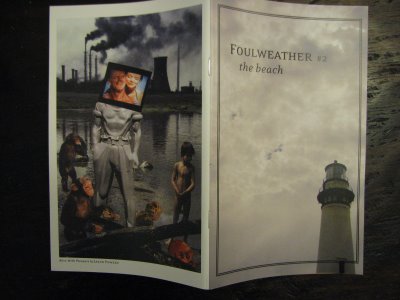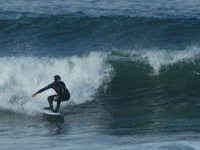Foulweather: Pete Lewis Interview
We’ve talked about the “surf collective” quite often in the last year. I sometimes wonder if there is any such thing. Surfing is mostly presented to us through the paid for media vehicles that we see in print, video, and on the web. But how representative is the sales driven mainstream media of the way we as surfers, as citizens and working stiffs, live out our surfing lives?
There probably isn’t a “surfing collective” as much as there is no American “mentality.” As a group we share one thing in common and that is riding waves. We are then fractured in our countless sub-cultures as well as political views. Class and social standing divide us even further — even within our tiny surf culture. Perhaps this is why the old DIY spirit that has been part of surf culture since the beginning is more important now than ever.
 I recently had the privilege to publish a short essay in a small literary publication called Foulweather. Pete Lewis, sole architect behind Foulweather, has been putting out a print zine in some form or another for some time. He is at once irreverent, introspective, and critical. In the latest volume titled The Beach, Lewis brings together writers, illustrators and activists from a wide range of backgrounds. The Beach is a celebration of the threshold between civilization and nature. It is also a critical look at the way our society has developed and perhaps devolved. But The Beach is also quite personal — looking at the way we love and play with nature and what we have to loose and gain.
I recently had the privilege to publish a short essay in a small literary publication called Foulweather. Pete Lewis, sole architect behind Foulweather, has been putting out a print zine in some form or another for some time. He is at once irreverent, introspective, and critical. In the latest volume titled The Beach, Lewis brings together writers, illustrators and activists from a wide range of backgrounds. The Beach is a celebration of the threshold between civilization and nature. It is also a critical look at the way our society has developed and perhaps devolved. But The Beach is also quite personal — looking at the way we love and play with nature and what we have to loose and gain.
We interviewed Pete because his work and his ideas play an increasingly important role in the future of our surf culture. There are others like him out there; maybe you are one – producing art, literature, music and film. People are taking up hand tools and making their own wave riding vehicles rather than buying a widget made in some far off factory. There is yet much hope in our surf culture and even in our humanity but like Stiv Wilson says in his essay in The Beach, “if we don’t activate, who will?”
Q. What’s your personal history with surfing?
Well I come from a village called Mumbles that is essentially the epicentre of surfing in Wales. That might not sound like much but most young boys I grew up with played rugby and surfed. That’s just what you did. However, just as I was about getting to the age to surf, we packed up and moved to Bahrain in the Persian Gulf. I remember asking my dad if there were waves out there and he said no. I was devastated. But I knew then, at age nine, I’d eventually surf. Instead of surfing, I spent a lot of time skateboarding and swimming. Two of the best substitutes for surfing, in my opinion. Then, whenever we’d go anywhere with waves, I’d body surf my brains out.
Finally, I moved back to Wales for University. I moved to Aberystwyth in mid-Wales on Cardigan Bay. Cardigan Bay doesn’t get much swell but when it does there are some classic boulder points and reefs that light up and it is relatively uncrowded. I spent three years reading American Literature and surfing in whatever waves I could find. After university I moved back to Mumbles and spent much of my time with menial jobs, on the dole and dialing in the Gower coastline, which was way more consistent than Cardigan Bay. Then onwards to Oregon where I’m continually humbled by the mighty North Pacific. In between, all that, I’ve had the fortune to surf in England, California, Canada, France, Spain, Mexico and Hawaii.
 Because I dreamt of surfing for so long before I got the chance to physically do it my definition of surfing has always been pretty liberal. For instance, a year or so ago, I was pushing my skateboard through rush hour traffic in Manhattan New York. Straight down the middle of the road, swerving between cars and ollieing manholes. It was about as far from a Hawaiian tube as you can get but to me it was just as satisfying and tapping into the same essence, as well as fulfilling the same primal urge, as surfing does.
Because I dreamt of surfing for so long before I got the chance to physically do it my definition of surfing has always been pretty liberal. For instance, a year or so ago, I was pushing my skateboard through rush hour traffic in Manhattan New York. Straight down the middle of the road, swerving between cars and ollieing manholes. It was about as far from a Hawaiian tube as you can get but to me it was just as satisfying and tapping into the same essence, as well as fulfilling the same primal urge, as surfing does.
Q. Foulweather has an aspect of social criticism. Do you think that in our modern lives of self-indulgence we are missing something that’s irreversible?
I certainly think that by removing ourselves from nature and complicating our lives with technology we’ve lost a lot. From what I understand, a growing number of psychologists are concerned that our increasing isolation from nature is having a devastating impact on our collective mental health. Not only that but some are suggesting we might be suffering collective Post Traumatic Stress Disorder as a result of what we’ve done to the planet. You used the term, irreversible, which I think is apt because, obviously we can’t put the genie back in the bottle unless we take drastic action or something drastic is thrust upon us, which is perhaps inevitable. Technology and science can’t be unlearned, but if they’re not we’re just going to continue to be locked in this vicious cycle of trying to further science and technology to combat the ills it has already thrown upon us. Or as Miki Dora said, “Until that very hour the bourgeoisie must be reconciled to their customary Orwellian entanglements, rushing to be saved by technology… and then saved from it.”
Q. The Beach covers a broad range of subjects and the authors/ surfers come from diverse backgrounds. I wonder what this says about the surfing collective? Do you think that there is such a thing as a surf culture/mindset that exists outside of the mainstream? And do we as a group have any responsibilities to the culture?
Well, for a long time, I was sceptical that modern surf ‘culture’ had much to offer. I was predominantly a skateboarder, and was blinded by the anti-authoritarian, DIY attitude of skateboarding. I though street skating offered a profound critique of the modern city, a redefinition of public space away from consumerism and commerce. I didn’t think that surfing had a similar critique. But I started reading more about surf history and surf culture and realized its profound role in the history of drop-out and youth subcultures. Eventually, I began to understand surfing as a metaphor for paradise lost mainly as a result of my fascination with Miki Dora and post War Southern California. That’s where I got the idea for the theme The Beach. The latest issue of Foulweather is basically my crude attempt at a socio-political history of The Beach as symbol of liberation and it was obvious to me that surfing played a central role in it. What ‘responsibilities’ do we have? I’m not sure surfers should accept any responsibility but we should be stewards of the ocean and the coast. And we should be an inspiration for people to prioritize getting off the computer and immerse them selves in nature. However, surf culture can be pretty hedonistic, self-indulgent and entitled, so I’m not sure many of us are qualified for those responsibilities.

Q. We’re big fans of the DIY spirit and it’s traditionally been a characteristic of surf and skateboard culture. You’ve been self publishing for a while and you promote unheard of writers — all with your own cash. Why do you do it? And do you think that the DIY spirit is dying?
I do it for me. I do it because, I’ve been writing since I was fifteen and never knew what the hell to do with my stuff. Essentially, I did it because sometimes it is better to make something happen yourself rather than wait for something to fall on your lap. But it wasn’t until I moved to Portland Oregon that I understood how possible it could be. I was really taken aback by how many writers, artists, musicians and so on, did things themselves. Created their own scenes, put out their own zines without a care about how they’d be accepted by the wider world. In this current age of mass communication, ease of travel and global interconnectedness, it is hard to shine as an artist. Perhaps, in a more ideal world, where ‘community’ actually meant something, artists would have an easy time proving their worth to the fifty or so people they are ‘tangibly’ connected to. In other words, I think the essence of DIY as being primarily responsible to your immediate community. Dischord Records out of Washington DC are a perfect example of this.
At the same, time, as I mentioned earlier, we can’t put the technological genie back in the bottle at this point and Foulweather has reached a wider community and as much as I have some concerns with ‘virtual community’ it has been a useful tool for connecting with people such as yourself.
I don’t necessarily think the DIY spirit is dying. I do worry that we are becoming increasingly specialized in our skill sets and that less and less people know where to begin when it comes to embarking on a DIY project. At the same time, as is evident from the abundance of blogs, the desire is still there to create, document and promote vital subcultures and scenes.
Q. In the Diamond Mining with Dora piece you talk about mans’ separation from nature and the subsequent repression of our primal urges. I think at Phoresia we tend to be optimistic about the future but sometimes it’s hard when we see the speed at which humanity consumes. What’s your view of the future for the way we will live and play?
I’m not qualified to comment on where we are heading but I tend to agree with Derrick Jensen that the sooner civilization crumbles the sooner the planet can recover. It might sound a bit radical but I really don’t see how we can continue being so globally interconnected and interdependent. The only hope I have for the future is if, people could eventually get back to a point they can get everything they need for survival and pleasure within walking distance of where they live. I don’t really see how more technology or more science can help us if we don’t have a healthy land base to live off. Until then I suppose we’ll just plod along with ‘band-aid’ solutions such as recycling and bio-diesel. That’s not to say we should abandon hope or daily efforts to live a more eco-conscious lifestyles.
Q. You chose a printing company that operates using a sustainable business model of their own design. The journal is printed on recycled paper with veggie inks. What is your definition of sustainability?
Again it’s a band-aid solution. If I’m going to use up resources to print a zine, I may as well try and limit my impact. I don’t think printing a zine is sustainable at all no matter how ‘eco-friendly’ we pretend the process is. Sitting around a fire with a few friends telling a story would be the only sustainable way of doing what I do with Foulweather but like everyone else, I’m willing to make huge compromises to get by in this modern world or I’d go insane. And, when I consider all the junk mail I get, I don’t feel too bad about printing a zine and hopefully, Foulweather inspires someone somewhere in one way or another.
Q. You’re well traveled. What’s your take on surf tourism and how it affects local cultures?
I was actually thinking about my travels the other day. Generally speaking, I’m quite lazy. Most of my travel opportunities have been thrust upon me. Due to being raised as an expatriate, I have certainly seen a few places and usually when I go somewhere I will take a surfboard or skateboard.
I will say that whenever I’ve surfed somewhere like Hawaii or Mexico, I always have the most fun, surfing with the locals. It is the tourists like myself that can make surf travel unpleasant. Again, it goes back to the sense of entitlement and hedonism in the culture. ‘I paid for this, I deserve my waves.’ In Hawaii, I found that a bit of humility, smile or nod, would go along way with the locals. I’m not into competing for waves. So when I’m somewhere new, I sit wide of the peak and wait until I feel I’m not intruding or wait for an invite to surf. I don’t always get many waves this way but it has resulted in some of the best waves of my life. As soon as it becomes a competition, I’m done. I don’t surf well or enjoy it. I’ll surf the mushier peak down the beach thanks, or better yet, I’ll go skateboarding with some friends.
In general, I think travel can be way overrated. Some of the most profound people I’ve met have barely left the town they are from and I’ve met some complete ignoramuses who’ve seen the world. I’m not interested in getting a Starbucks in Shanghai or eating MacDonald’s in Dubai. I am interested in what books my neighbour reads and why even though we both obviously like Black Flag we’ve never shared a cup of tea or a pint of beer.
Q. Will you always surf?
 To me, surfing is the ultimate form of leisure. I can’t quite verbalize it and I probably shouldn’t but surfing makes me feel human. There is a scene in Terrence Mallick’s “The Thin Red Line” where an American GI goes AWOL in WWII. He is living on an island near the South Pacific, away from the chaos of war, swimming with naked children, living off the sea and land. That’s where I go when I surf.
To me, surfing is the ultimate form of leisure. I can’t quite verbalize it and I probably shouldn’t but surfing makes me feel human. There is a scene in Terrence Mallick’s “The Thin Red Line” where an American GI goes AWOL in WWII. He is living on an island near the South Pacific, away from the chaos of war, swimming with naked children, living off the sea and land. That’s where I go when I surf.
I’m pretty much a lost cause. I obsess over it. Forecasting, board specs, improving my cutback, it all often consumes me. Sometimes, I feel so shallow because of my surf/ skate obsession and have to make a conscious effort to widen my interests/ experiences. I’m currently saving sick time in case an elusive Southern hemisphere swell makes it up to Oregon this summer.
Q. Last words?
Thanks for giving me this opportunity, I’m not sure I’m worthy of this interview but I respect what you are doing with Phoresia and your criticisms and celebrations of surf culture and the surf industry. Support your local shapers, surf shops, farmers, coffee roasters, beer brewers, zine makers, ha ha. Seriously though, consider how and why you consume and travel wisely. Unplug and go outside for a bit.
I’m about to lock myself in a metal box, drive 70 miles spewing up god knows how much carbon monoxide for a few waves…
You can read Pete’s Foulweather blog here. You can also order a copy of The Beach from Pete’s site or from Powell’s Books.
Pete rips it up on the page, in the watet, on the street and at the park yo!
:-)
Pete RULES! Great interview with a thankfully humble soul. Time for me to prioritize getting off the computer and immerse myself in some nature…
Buy Foulweather now or forever be a kook!
One of my favorite humans. Rad interview with a rad guy.
Love the DIY ethic. Nice to see some of the values from punk’s early days have carried over. Love the candid-ness as well.
Biodiesel a bandaid!?!? Blasphemer!
I’ve known Pete Lewis a short while and think very highly of his genuine qualities. He writes about the issues that matter to me, only when he does it I feel relaxed, when I write about these issues I’m freaking out the whole time trying to make my views understandable to the audience, and it is pretty apparent to the reader methinks.
I really do think his writing needs to be read by everyone. When I say everyone, I mean everyone everywhere in every culture because his writing is THAT ubiquitous. I would only hope that everyone would jive with the message. If they did “things” would be much more pleasant in this world.
Pete, I haven’t surfed in 10 months. I haven’t sanded that last bit of my home-made surfboard and put my final coat of varnish on it yet. In fact, you’ve inspired me to put off my house chores and go fiddle with my quasi-creation.
I Always acess your Blog through my Google Reader. Now I decided add your link to my blog (siebertsurfboards.blogspot.com) that’s Ok?
Good Waves…
Thanks Felipe. You’ve got some nice looking boards there. Too bad I don’t know Portuguese, but the pictures pretty much speak for themselves. Nice work.
Check out Felipe’s handcrafted wooden surfboards here:
http://www.siebertsurfboards.com/
thanks man…
if possible change my link in your blog ok?
change “plywood” for “siebert”…
plywood is my old name…
see ya,